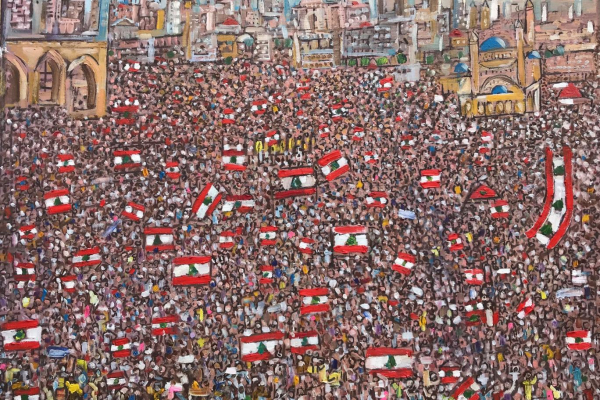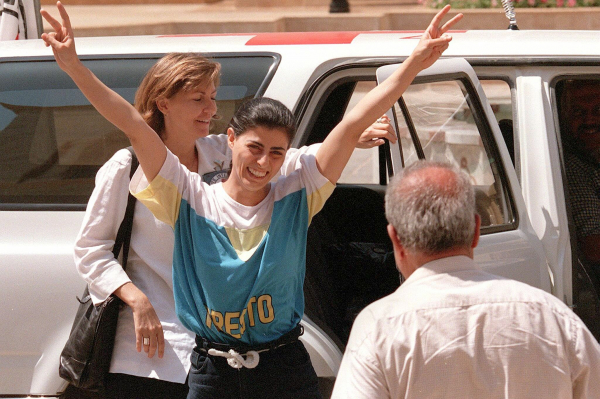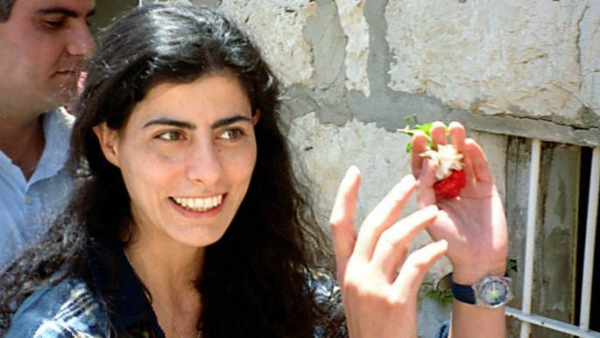Political and socio-economic program regarding the uprising and the transitional phase
Meanwhile, those in control of the banking and rentier capital – the 1% – own approximately half of the national wealth. The class gap has increased as the rich get richer, the poor get poorer and the middle class disappears. Even basic commodities and services such as electricity, water, transportation and telecommunications are sinking to new lows.
And so, the people took to the streets, filling public squares for weeks and using their right to protest to the full in all of Lebanon. The authority stuck to its tune and focused on maintaining power, completely oblivious to the transformation on the streets. The old tricks of repression, intimidation and accusation were used against the popular uprising, while some tried to ride the way and hijack the people’s struggles for its own petty interests.
This new phase is also characterized by Lebanon nearing economic and monetary collapse. The regime’s failure to come up with any political and economic solution also foretells the collapse of the sectarian system that has been in force since the Taif agreement – Hence the need for a radical structural change. Our purpose is now to turn this popular uprising into a national democratic revolution against the regime and its ruling parties who are responsible for Lebanon’s tragic economic situation.
One can only notice the failure of capitalism worldwide – economies are slowing down while élites hoard capitals and the class gap increases, whether in developed capitalist countries or countries in development. From Iraq to Sudan, but also Latin America and Europe, the peoples are rising against social inequality, poverty and exploitation of the masses.
Only a radical, immediate and complete political transformation can end the sectarian divisions, constitutional crisis and economic collapse Lebanon is facing. A first step would be the creation of a transitional government from outside the ruling parties to implement a temporary economic salvation and political change program. Such a program would include deep changes that would aim to replace the current sectarian regime with a secular democratic state, and the current capitalistic monopolies with a progressive economy that guarantees social equality and fulfills the dreams of young ones, educated citizens, women, working classes and middle classes.
First: Political change and the foundation of a secular state
- To pass non-sectarian electoral legislature that rely on proportional representation with Lebanon as a single district; reforms the use of advertising and the media for electoral purposes and limits campaign spending; lowers the voting age to 18; and guarantees a female quota. All of this would aim to decrease sectarian and financial influence on the electoral process and therefore guarantee a fair representation of political forces. The Parliament would thus be able to pass the necessary laws to reform the Lebanese political system and go ahead with much-needed economic and social reforms.
- To hold early Parliamentary elections to reshape political power after the uprising showed that the ruling élite do not represent the people. The political and economic impasse the country is stuck in further point to the urgent need for early Parliamentary elections.
- To apply Article 22 of the Constitution which calls for the election of a non-sectarian Parliament while confessions are represented in a senate whose authority is limited to critical issues.
- To draft a unified civil status law that is temporarily optional and becomes mandatory after 10 years; and draft a new national law for political parties.
Second: Fighting corruption
Corruption is an intrinsic component of the confessional system and of clientilism, the abolishment of which is long overdue. Laws must also be enacted with regards to the recuperation of stolen public funds, the independence of the judiciary, and lifting the immunity off public servants (whether in the government, the Parliament or public administration). The judiciary must also be empowered to prosecute the authors of administrative and financial violations. A national committee with judiciary and executive jurisdiction must be enabled to access and study files, lift banking secrecy, and take legal actions before the competent courts. The committee will also have headquarters, a budget, and an administrative and judiciary apparatus that enable it to operate as soon as possible.
Third: Resolving monetary and financial issues
Lebanon’s ongoing monetary and financial issues are a symptom of a larger and deeper economic crisis, caused by the tyranny of rentier activities and underproducing sectors; the collapse of the state’s infrastructure and basic functions; the absence of technological advancement and innovation; the huge gap in income and wealth distribution; decreasing returns on activities; all coupled with increasing costs of living. The youth have particularly been affected and forced to choose between emigration and unemployment, while workers, employees and many low- and middle-class social categories have suffered from decreasing purchasing power.
Our economy and society are also plagued with poorer working and middle classes who are disproportionally targeted with taxes and health, transportation and residence expenses.
The following solutions can help avoid the imminent monetary collapse during the transitional period:
- Changing Lebanon’s economic policies since 1992, and declaring to the markets and economic agents that this period has ended once and for all. The old pattern of borrowing capital and the resulting rentier capital must be done away with. Overspending and low tax on capital has increased public debt while the 1% amass wealth. Unless this is changing, no policy, reliance on growth or external funding will solve anything.
- Working to solve the problem of increasing public debt though the Central Bank’s gradual conversion of government bonds into eternal, 0-interest bonds, which will positively affect the State’s balance. On the other hand, banks must withdraw their deposits and invest them in the economy.
- Negotiating the cancellation of a large section of LBP and USD debt with banks, along with decreasing the high value of deposits owned by around 1% of depositors.
- Restricting the transfer of capitals abroad to students’ living and educational needs and import/export transactions.
- Putting new customs tariffs on imported luxury goods.
Fourth: Fiscal system
The Lebanese economy needs a new fiscal system that targets profit and wealth and provides the state with the income it needs for basic functions and public services, instead of giving away such jobs by means of privatization as mentioned in the Hariri government’s “reform paper”. Often called “the partnership between the public and private sector”, it actually consists of handing over ownership of the people’s public assets and property to capital owners. The state must also enact progressive tax policies that guarantee both fiscal equality and a stable source income for the state. The new fiscal system would rely on the following:
• Increase the average tax on financial companies to 30%
• Implement a progressive 7% to 15% tax on bank interests
• Implement a 2% tax on millionaires’ net worth
• Apply a flat 45% death and gift tax with a 1-million dollar exemption bracket to exempt the vast majority of low- and middle-income classes (particularly from rural areas) from this tax, unlike the current situation
• Implement taxes on real estate income, foreign income and land and property (awqaf) owned by religious institutions; limit any VAT increase to luxury goods; annul tax waivers for holding companies and Solidere; annul rent waivers granted to users of state property; stop tax evasion by means of holding companies and others.
This fiscal reform will increase tax income from wealth and high income and profits, thus guaranteeing the state a steady income of tens of billions of dollars over the coming years. These can be invested in the infrastructure and the improvement of production structures. Such taxation will not affect the economy as it only affects high income and stocked wealth or imported luxury goods. The income can then be reinfused in the economy and used to create jobs, increase productivity and decrease interests as the public debt decreases; all of which also positively affects private investment.
Fifth: Central Bank policy
The Central Bank has proved to play a pivotal role in the currency and financial crisis. Its policies must therefore be broken free from the monopolistic banking élite’s narrow interests, and be more in line with the Lebanese people’s need for productive investment and employment, as follows:
First: Require the banks to make detailed profit and loss sheets available to the public so that public debt can be evaluated transparently.
Second: Dismiss the Central Bank leader and make the Central Bank’s policies subject to democratic accountability before the Parliament by means of periodic hearings where the Central Bank leader appears before currency and economy committees.
Third: Require the Central Bank to make the minutes of its Central Council meetings available to the members of Parliament and public. Such transparency would help with enacting monetary policies and setting Central Bank interest rates.
Fourth: Add the objectives of economic growth and high employment to Article 70, as they are independent objectives that are as important as the objective of maintaining the value of the national currency.
Sixth: The State’s role in the economy
Aim at restoring the State’s active role and confirm its ownership of electricity, telecommunications, water and power. Have a long-term economic vision. Include in the government’s budget the completion, maintenance and development of public utilities and infrastructure equally in all territories. Offer basic social services such as health, public education, the Lebanese University, public transportation, social welfare, retirement, unemployment benefits and help for people with special needs to become productive actors.
Public expenses must also be restructured. The period of the Taif régime distributive spending and channeling of funds toward political clientelism and direct and indirect private sector channels without clear regulative policies. Another thing that must end are grants that are currently awarded to the private sectors, such as schools and universities and the construction and telecommunication sectors. This spending can be rechanneled within the framework of fairer and more effective policies with a clear socio-economic basis.
The state must work to increase salaries in the private sectors given the new USD/LBP rate and subsequent price increase.
The state must also tackle the root causes of the increasing cost of living such as the monopolistic nature of the internal market and importing markets and the merchants’ abuse of the commercial representation law. The government must also commit to consumer protection and food safety laws and draft a fair competition and anti-monopoly law.
The electric sector is also a priority in the transitional period. The government must obtain low-cost loans from friendly countries and invest them in this sector. It must also thrive to obtain and use the necessary modern equipment to hasten the switch from expensive liquid fuel to the less expensive and more environment-friendly gas, help EDL offer services up to uninterrupted 24-hour supply, and end the use of expensive and polluting private motors. It must also encourage public and private investment in the development of renewable energy such as solar and wind power technologies among others. It must also work to increase the quality and coverage of Internet and telecommunication networks and decrease their costs and fees.
The construction of a modern, developed public transportation network has become a necessity given the traffic and resulting costs and pollution. A huge train, metro and public bus network over the whole Lebanese territory will also have a positive developmental impact.
Lebanon’s fuel and gas wealth must not be viewed simply as a source of income. It can be used as a positive leverage for economic (and particularly industrial) growth and as an effective tool for social and technological development.
Seventh: Political and other pressing issues
National cause and resistance
Work to free the Lebanese state’s political decisions from dependency on foreign powers. The state must be able to resist the Zionist project which is an enemy of Lebanon and runs against the presence of a modern civil state. It must also protect the land and its wealth, in line with Lebanon’s history of resistance. The army must be fully equipped, and the state must guarantee its funding without turning to conditional grants that are linked to foreign agendas. These are necessary for the liberation of the remaining occupied territories, to preserve internal unity and to empower the bolder villages’ capacity to stand fast and resist.
The issue of Palestinian refugees and displaced Syrians
The Lebanese government must work to help the displaced Syrians, including by helping them return home, in collaboration with the United Nations and the Syrian government. It must fight against all kinds of racist speech and acts against Syrians, Palestinians and foreigners. It must also keep pressuring international organisms into providing funds and helping local organisms that take care of refugees and displaced persons.
The Lebanese government must grant Palestinian refugees in Lebanon their basic civil rights, in particular the right to work, to education and to medical care. This is in line with international treaties and agreements, with the spirit of brotherhood between the two peoples, and with the purpose of improving their economic and social situation.
Foreign policy
The Lebanese government must enact a new foreign policy that is based on opened toward a multipolar world. Lebanon would thus play an effective political against American unilateralism, imperialistic militarism, political interference, and policies of sanctions and economic embargo; and for the peoples’ right to self-determination, national liberation and socio-economic development. It must also strengthen its relationship with progressive political forces and with political and economic emerging powers, in particular the People’s Republic of China, in the interest of all countries.
The Lebanese government must also support the Palestinian issue and the right of the Palestinian people to resist the occupation, stop the colonization, keep its territories, hold on to the right of return and self-determination, and build a secular democratic state on all of historical Palestine, in the face of Zionist state Judaization policies, colonization and displacement of the Palestinian people.
With regard to the Syrian crisis, the government must also support a political situation that guarantees the unity of Syrian lands and fully respects the political, economic and cultural rights of all national components, under a democratic government chosen by the Syrian people. It must also condemn economic sanctions and foreign interference in its affaires and resume political and economic relations with it.
The government must also end its dissociation policy, instead using political and diplomatic leverage to offer solutions to issues the Arab world is facing and encouraging economic partnership with Arabic countries. This will help achieve social justice, development, security and stability in other countries, particular Syrian, Yemen, Libya and Iraq.
Political Bureau of the Lebanese Communist Party
January 15, 2020



